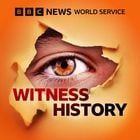On 8 December 1941, Japanese troops landed in northern Malaya marking the start of the second world war in the Pacific.
Invasion forces moved quickly down the British colony – which is now called Malaysia - capturing Singapore in just 55 days.
Their occupation ended on 15 August 1945, when Japan surrendered to the allies after the US had dropped two atomic bombs.
Dorothy Variyan, who lived under Japanese rule for more than three years in south west Malaya, speaks to Jacqueline Paine.
This programme contains archive which uses outdated and offensive language.
Eye-witness accounts brought to life by archive. Witness History is for those fascinated by and curious about the past. We take you to the events that have shaped our world through the eyes of the people who were there.
For nine minutes every day, we take you back in time and all over the world, to examine wars, coups, scientific discoveries, cultural moments and much more.
Recent episodes explore everything from how the Excel spreadsheet was developed, the creation of cartoon rabbit Miffy and how the sound barrier was broken.
We look at the lives of some of the most famous leaders, artists, scientists and personalities in history, including: the moment Reagan and Gorbachev met in Geneva, Haitian singer Emerante de Pradines’ life and Omar Sharif’s legendary movie entrance in Lawrence of Arabia.
You can learn all about fascinating and surprising stories, like the invention of a stent which has saved lives around the world; the birth of the G7; and the meeting of Maldives’ ministers underwater. We cover everything from World War Two and Cold War stories to Black History Month and our journeys into space.
(Photo: Members of an Australian anti-tank gun crew fire weapons at a Type-95 Japanese tank on a road temporarily blocked by a felled tree, outside Singapore, British Malaya, April 1942. Credit: Office of War Information/PhotoQuest/Getty Images)


